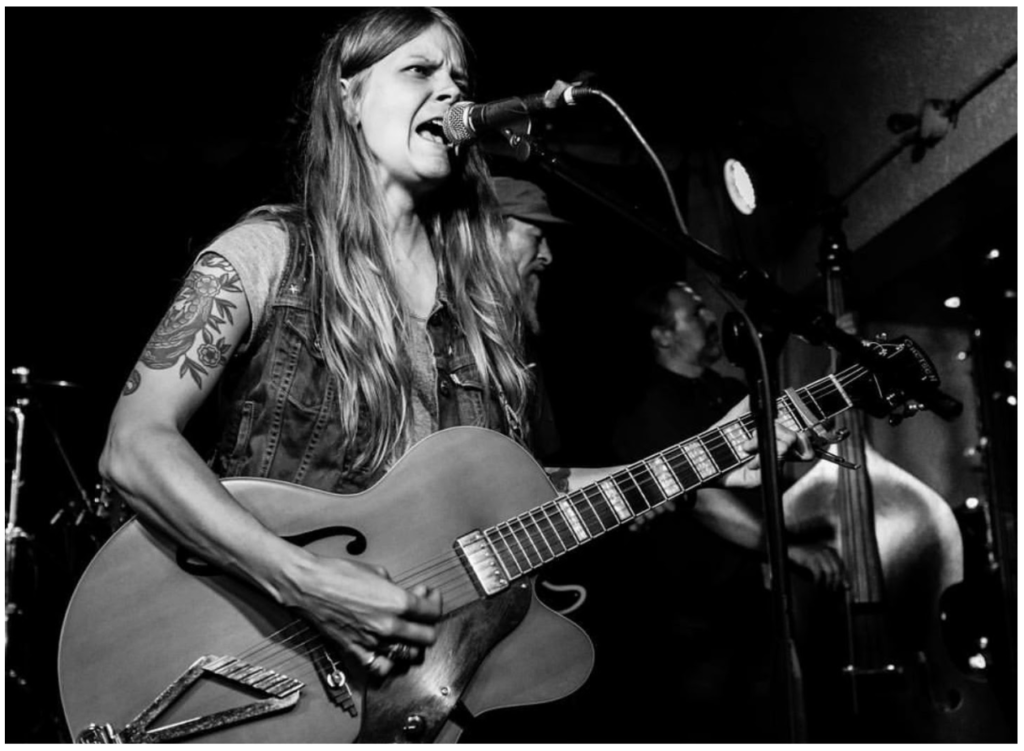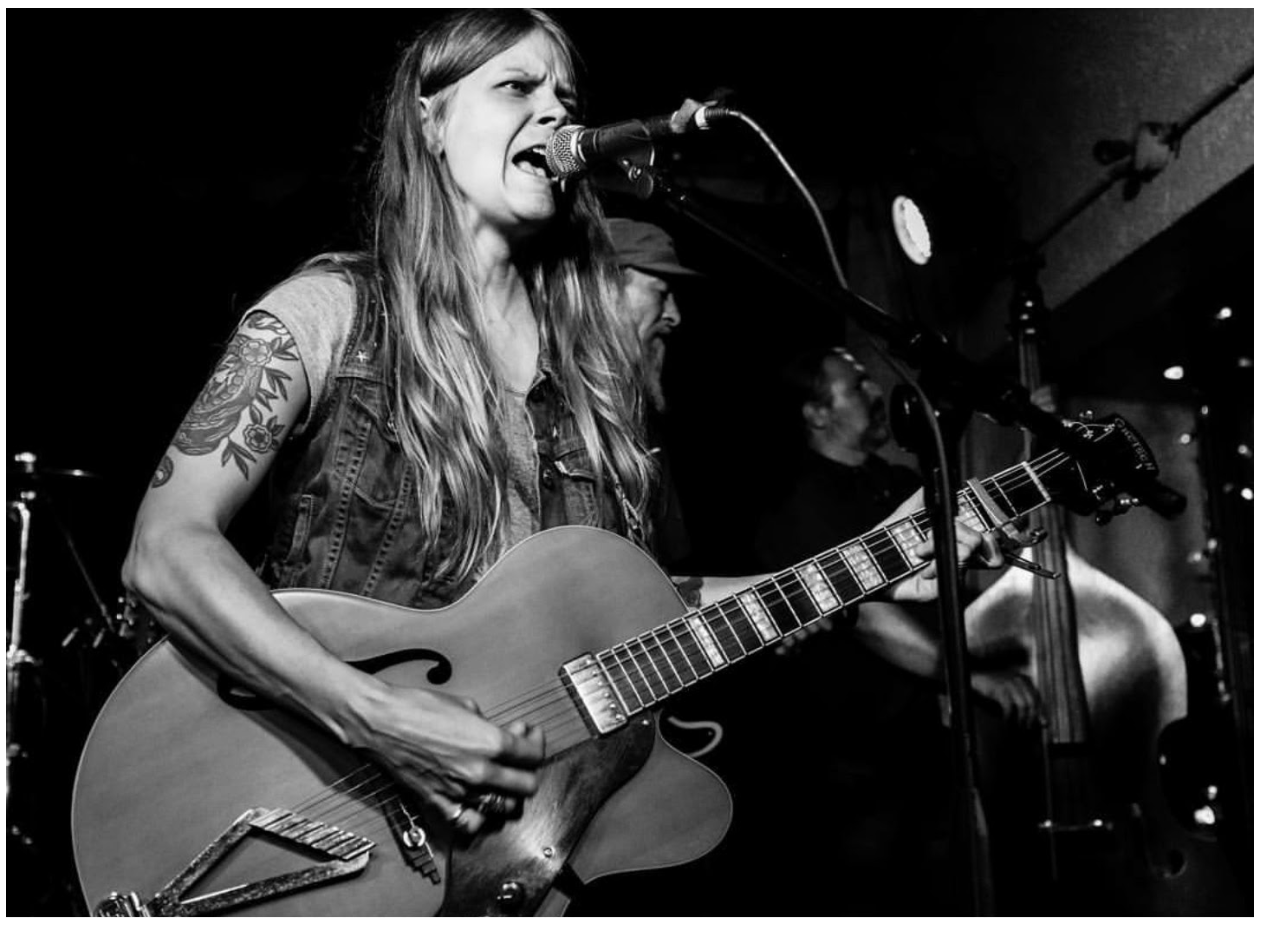An Interview with Sarah Shook: Evolving
When I saw Sarah Shook and The Disarmers last year, I walked out feeling like I’d just been to a punk show, a country show, and maybe a rally, and definitely to church. Their live show is nothing short of cathartic. Years, their sophomore album, was one of Red Line Roots’ Best of 2018, for its, “honesty, vulnerability and self awareness that is incredibly refreshing.” Sarah is on her way back to Boston this week, and we caught up ahead of her show at Great Scott this Friday.

RLR: I’d love to start with the 7” you released last November, with a couple of outtakes from Years. “The Way She Looked At You” seems initially jealous, sort of like, “Tennessee Waltz,” but it shifts to that perspective of having fallen out of love. Can you talk about how you think about setting up one expectation and then flipping it?
SS: I didn’t set out to be crafty with “The Way She Looked At You,” or make you think one thing and then it turns out it’s the opposite. It was very much based on an actual experience. There’s this one little bar in Pittsboro that is the place everybody hangs out. That’s about to change, because Pittsboro’s blowing up, but at the time, there was one bar to go to, so that’s where I was all the time with my then-boyfriend and all of our pals. So there was a night where we were sitting on the porch outside, drinking and smoking, and I looked over at a mutual friend of ours who was talking to him, and listening to him talk, and just as a very separate, objective observer, watching her talk with him and seeing the way she was looking at him, I knew. And I didn’t have pangs of jealousy or insecurity at all. I was just like, “Oh wow. She’s really into him. And…I don’t give a fuck. [Laughs] So maybe I need to think about that.”
RLR: [Laughing] That’s awesome. So how do you think about the transition between that experience to a song?
SS: That’s never a conscious decision, because I feel like I have a lot of experiences in my life that would be worthy of being written about in a song.
“Damned If I Do, Damned If I Don’t,” is about the same ex. And it’s also from both of our points of view, because we had both been the person standing on the front step trying to get in, wondering if we were using the wrong key or if our partner had changed the locks while we were out on a tear.
RLR: It’s sounds like you’re OK with the misinterpretations. I know people have different feelings about that.
SS: There are plenty of artists that get very frustrated with that, and I understand that. I’ve just seen it happen so many times, not just to myself, but other artists as well, that I just don’t feel like it’s something we need to get bent out of shape about, unless it’s an incredibly controversial misunderstanding. But if you’re just some everyday Joe who’s switching a little detail and that makes it more relatable, then knock yourself out. That’s the whole point of art–is that it should be relevant.
SS: I was actually a bank teller five years. It was pretty soulless. I didn’t mind, because I really loved my co-workers.
We had a client who was impossible, and I had this goal that I was going to win this person over one day. Every single damn day they came in, they’d just complain about everything. They came in often enough that we knew their family and we knew there were good things going on, it was just this really black cloud.
So this one day, I just got so fed up with this person’s attitude–not with them, but with the whole principle of being negative even when good things are happening for you. So I went home and wrote “Devil May Care,” in this very frustrated fashion. Anyone who knows me well can tell you that I actually do care a lot about people. But I kind of wrote that about it; and it’s so uncharacteristic of me to be like, “Fuck you, buddy.”
RLR: Did you ever win them over?
SS: I got a little half-smile one time. I count that as a victory.
RLR: So you just mentioned sort of writing in this frustrated release. I’m wondering how your process has changed in this time from going from writing around a day job at the bank to being on tour all the time?
SS: It’s pretty hard to find alone time, and I definitely have to be alone to write. Or, in the past, I’ve had to be alone to write, and I’m trying to evolve that process, because it has to change. If I’m going to keep writing songs, I have to get used to having someone in the van, or hotel room, or in the green room. When I’m on tour, I’m surrounded by five dudes. That’s just the way it is: me and my dudes out on the road. So I guess the next step in my evolution as a songwriter is figuring out new strategies for carving out time and space to write. I usually bring a little audio interface on tour that I can record on; and maybe if I have headphones on and I’m just playing into my ears, it won’t bother me that someone else is there.
RLR: In general, when you bring a song to the dudes, is it pretty well finished?
SS: Yeah. Basically, I write the lyrics, melody, chord progression, sometimes different interludes, intros or outros. Sometimes I’ll have different arrangements, but it’s the song, it’s the whole fucking song. Then I’ll take that to the band and we will, in a very collaborative way, play with different people’s ideas until we find what’s best suited for the song. It’s ultimately what serves the song best.
RLR: But circling back to that need for alone time, you probably don’t want that input too early.
SS: Right. Exactly. I’m very protective of that, because a song such a personal thing. I will definitely take input on where we want to put the second solo or if we want to split the solos up into half a verse, half a chorus. But as far as lyrically, the melody, and the chords, I’m really protective because I feel like the music serves the lyrics and you can’t separate those things. So that’s not even a discussion we have.
RLR: I caught you at Atwood’s the last time you were there, and it was striking to me how much you just committed to the emotional quality of every song, sometimes shifting from bitter humor to vulnerable heartbreak and back again. And I came out of there thinking that there must be days when that’s just exhausting. Does that resonate with you, or do you think about your shows differently than that?
SS: It is exhausting. I’ve had to grow in a lot of ways very quickly over the last couple of years. There are a lot of artists who get to the point where we’re at, where you’re making a paycheck, and that’s what people want, they just want to make money. I’ve never wanted that from music. Music is so much more sacred to me; songwriting is so much more sacred. It’s the thing that connects us.
When I was writing songs in my early twenties, and playing shows, and was every bit as vulnerable with songs at that time, I always felt it was very much for me: it was a catharsis and was getting out what I needed to get out. And it’s only been over the past few years that I’ve seen how much that helps people; when they hear words or a refrain or phrasing that helps them feel less alone. That’s why I make music. And if you make music for any other reason than to genuinely change someone else’s life, then I don’t know what the fuck you’re doing.
So, to answer your question, it’s exhausting. I’m still learning how to navigate that: to give as much as I can in the live performance and then meeting people after the show, and listening to people’s hearts and what they’re going through. I’m still figuring out how to have something left for myself. It’s an interesting process; I’ll keep you posted on what I find out.
You should absolutely be there on Friday night when Sarah and her band play Great Scott. The chance to see them in a venue this size won’t be around much longer. Get tickets and tour information here.

